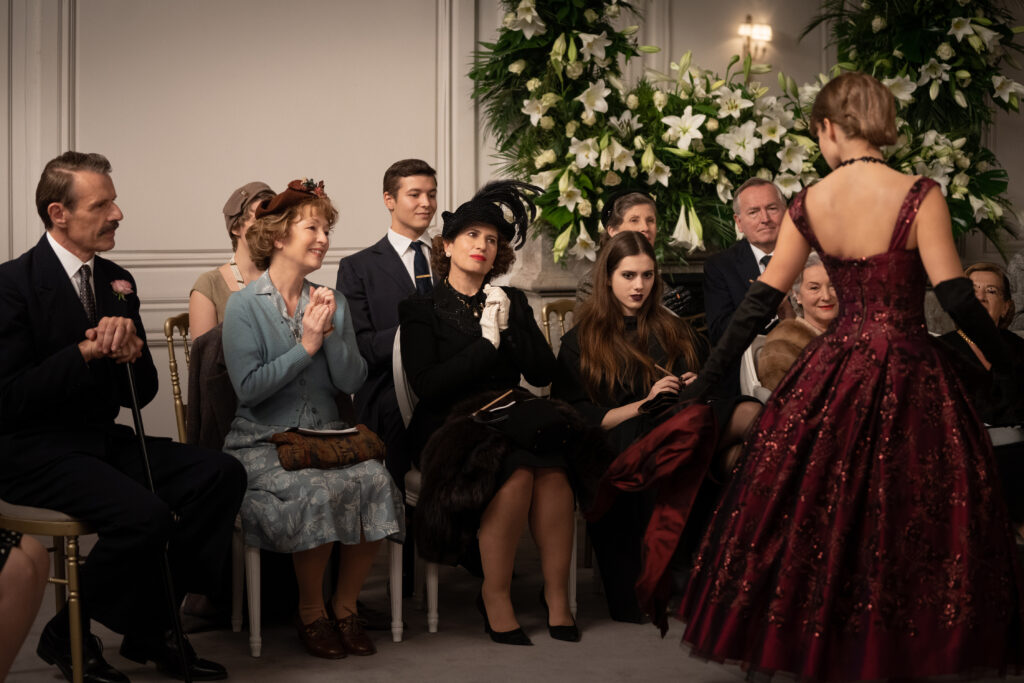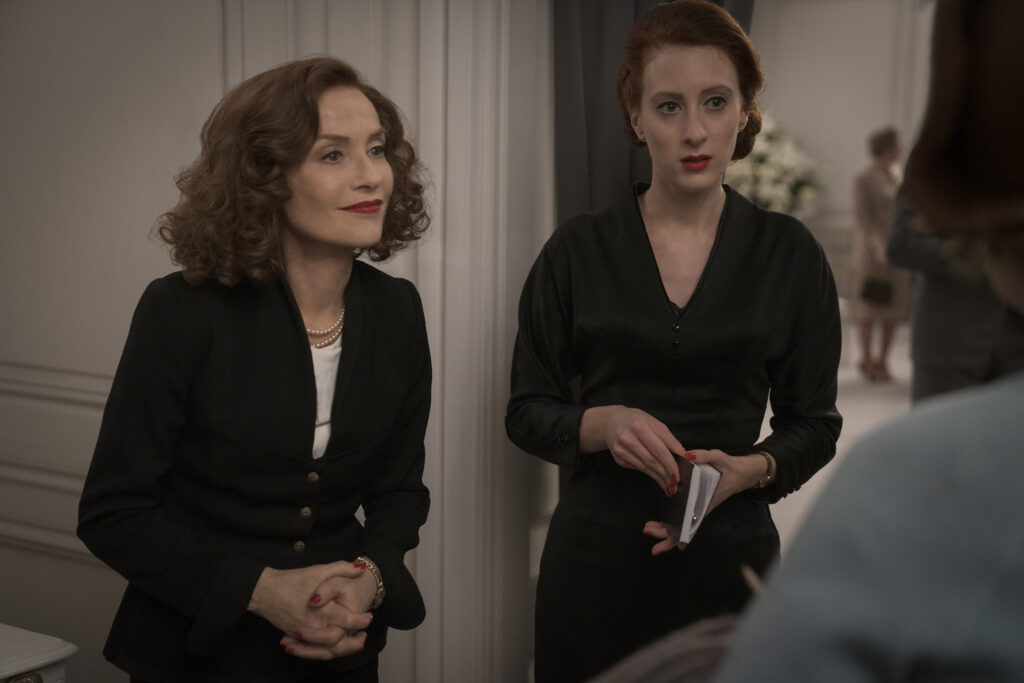July 11, 2022
by Carla Hay

Directed by Anthony Fabian
Culture Representation: Taking place in 1957, in London and Paris, the comedy/drama film “Mrs. Harris Goes to Paris” features a nearly all-white cast of characters (with a few black people) representing the working-class, middle-class and wealthy.
Culture Clash: A widowed housekeeper in London goes to Paris, where she wants to fulfill her dream of buying a haute couture Dior gown, but she experiences obstacles and bigotry from snobs who think she isn’t worthy because of her working-class background.
Culture Audience: “Mrs. Harris Goes to Paris” will appeal mainly to people who are fans of star Lesley Manville and the book on which the movie is based, as well as to people who are interested in 1950s high fashion history and stories about working-class people navigating in upper-class society.

Despite a tendency to be cloying and cliché, the comedy/drama “Mrs. Harris Goes to Paris” has exuberant charm that’s hard to resist. Lesley Manville shines in this fairytale-like story about a woman who believes it’s never too late to chase a dream. On the surface, her dream is to buy a haute couture Dior gown, but the gown represents something much bigger to her: an ability to go outside her comfort zone to get what she wants in the pursuit of happiness.
Directed by Anthony Fabian, “Mrs. Harris Goes to Paris” is based on Paul Gallico’s 1958 novel “Mrs. ‘Arris Goes to Paris.” The novel was also made into a 1992 TV-movie of the same name, starring Angela Lansbury in the title role. In the “Mrs. Harris Goes to Paris” movie directed by Fabian, the title character is played by Manville. Fabian co-wrote the movie’s adapted screenplay with Carroll Cartwright, Olivia Hetreed and Keith Thompson.
“In Mrs. Harris Goes to Paris,” it’s 1957, and Mrs. Harris is Ada Harris, a widowed housekeeper who’s in her 50s and who lives in London. (“Mrs. Harris Goes to Paris” was filmed in London and Paris—the two cities where the story takes place—but the movie was also filmed in Budapest to simulate Paris in the 1950s.) Ada dreams of having a more glamorous life. Ada’s often cheerful demeanor often hides her sadness over not knowing what happened to her husband Eddie, a military man who went missing in action during World War II in 1944.
Because Eddie hasn’t contacted her for all of these years, he’s presumed dead, but Ada can’t bring herself to face this probability. Ada, who lives alone and has no children, has not had a special man in her life since Eddie disappeared. She has long since given up on finding love because she thinks because of her age, occupation and physical appearance, she’s not very desirable.
“Mrs. Harris Goes to Paris” spends a little too much time in the first third of the movie showing Ada stuck in her drab routine life in London. There are repetitive scenes of her going to a bridge at night, where she talks out loud to her long-lost husband Eddie. Viewers of “Mrs. Harris Go to Paris” will have to have some patience before the movie gets to what the movie’s title is all about.
Ada’s best friend is Vi Butterfield (played by Ellen Thomas), a Caribbean immigrant who is around the same age as Ada. Vi (who also lives alone and has no children) is as confident as Ada is insecure. When Ada and Vi go out together at social clubs, Vi often has to give Ada pep talks to help boost Ada’s self-esteem. When they go out to these clubs, Ada is more likely to play cards at a table than to mingle and dance.
It’s at this nightclub, when Ada and Vi are sitting together at a table, where Ada gets the courage to open a package from the U.K. military that she has been dreading to open in front of Vi. Inside the package are a telegram and some of her husband Eddie’s personal possessions, including what appears to be a university ring.
Ada reads the telegram out loud to Vi. The telegram confirms that Eddie is dead. He was killed in action near Warsaw, Poland, on March 2, 1944. Ada is saddened but not too surprised. After getting this news, she goes to the bridge again and stares mournfully at Eddie’s ring, as if she’s trying get closure over the reality that Eddie won’t be coming back.
Someone whom Ada and Vi see often is their mutual friend Archie (played by Jason Isaacs), a middle-aged local bookie whose social manners are a little rough around the edges. Archie is a bachelor who thinks of himself as a seductive ladies’ man. Whenever, Ada and Vi see Archie at a nightclub, he always seems to have a different woman as his date.
During one scene in the movie, Archie has brought his two dogs Spring and Summer to the nightclub where Ada and Vi frequently go. Archie asks Ada and Vi to look after the two dogs while he goes on the dance floor with his date. Ada sighs and says to Vi about how the men at this club don’t see them as attractive enough: “We’re invisible women.” Vi’s sassy response is: “Speak for yourself! They see me coming!”
Two of the women who are Ada’s regular clients are very different from each other. Pamela Penrose (played by Rose Williams) is a 23-year-old aspiring actress who looks like a cross between Jayne Mansfield and Marilyn Monroe. Pamela is constantly worried about auditions and whether or not she will ever make it big as a movie actress, which is her life goal. Even though Pamela rents an apartment that she can barely afford, she pays Ada on time and appreciates Ada’s cheerful kindness.
The same can’t be said for Lady Dant (played by Anna Chancellor), a middle-aged socialite who spends lavishly but who has come up with many excuses not to pay Ada for the past several weeks. The latest excuse is that Lady Dant has to pay for her daughter’s wedding, which Lady Dant claims is financially draining. When Ada tactfully and politely asks Lady Dant when she can be paid the money that’s owed to Ada, Lady Dant is haughtily dismissive and scolds Ada to be more patient and understanding. Lady Dant also tells Ada that her work hours will be reduced, effective immediately.
Christian McKay is under-used in a small role as Giles Newcombe, one of Ada’s housecleaning clients. A running gag in the movie is that Ada often passes by Mr. Newcombe on a flight of stairs as Ada is arriving and he is leaving the building with a woman who looks young enough to be his daughter, whom he always introduces as his “niece.” The implication is that Mr. Newcombe is married, these young women are really his mistresses, and they have their trysts at the apartment he has in this building.
Ada and Mr. Newcome always greet each other in a friendly manner, with Ada seeming to know that Mr. Newcombe isn’t the “uncle” of these women. Ada is discreet and plays along with the charade though, because Mr. Newcombe is always kind to her. Ada doesn’t judge whatever Mr. Newcombe’s extramarital activities might be because she doesn’t know all the details of his marriage. It’s also this movie’s way of showing that Ada isn’t a nosy gossip.
One day, Ada is doing some housecleaning in Lady Dant’s home, when she sees a stunning floral print sequined dress displayed on a bed. Ada is enchanted by this dress and can’t resist picking up the dress and holding it up to herself while she looks in a mirror. Lady Dant catches Ada admiring the dress, but Lady Dant doesn’t seem to mind.
Lady Dant brags to Ada that the gown is haute couture Dior and that she paid £500 for the dress during a recent trip to Paris. Lady Dant orders Ada not to tell Lady Dant’s husband about this purchase because he will think that she overpaid. As soon as Ada hears about how and where Lady Dant got the dress, it sparks an a near-obsession for Ada to do the same thing.
Ada begins saving her money for a trip to Paris. She also starts a small business on the side called Invisible Mending, where she does seamstress work and other sewing jobs. However, Ada gets a temporary setback when she places a losing £100 bet at a dog-racing track where Archie works.
But then, in an “only in a movie” sequence of events, three things happen literally within minutes of each other that change her fortunes: (1) Ada gets a visit from a military official telling her that the military owes her back payments for being a war widow; (2) Ada gets reward money for returning a lost diamond pin; and (3) Archie shows up at her home to tell her that he actually placed her bet on the racing dog that won, not the losing dog she wanted to bet money on for the race.
And so, with enough money to travel and buy her dream Dior haute couture gown, Mrs. Harris goes to Paris. At the train station in Paris, she meets three homeless winos, and one of them is kind enough to show here where the House of Dior is. Ada notices that there’s a lot of garbage on the streets of Paris, so the homeless man tells her that it’s because garbage collectors are currently on strike. This worker strike is used as a few plot developments later in the movie.
Outside the House of Dior, a model who’s running late for a fashion show, stumbles out of car and trips in front of the entrance. Her name is Natasha (played by Alba Baptista), and she accidentally drops her purse without noticing. Ada picks up the purse and goes inside the building to return it to Natasha, who is grateful.
But those pleasantries are about to end when the pompous House of Dior director Claudine Colbert (played by Isabelle Huppert) notices that Ada is treating the House of Dior like a regular retail store, where people can just walk right in and buy what they want if they have the money for it. Madame Colbert snootily tells Ada that Dior’s haute couture customers have invitation-only access.
Ada most definitely does not have an invitation. Ada gets upset and hastily explains to Madame Colbert that she’s a housekeeper from London who saved up all of her money for this trip and she won’t leave without buying a Dior haute couture gown. When Ada takes out the wads of cash that she has with her, Madame Colbert is even more disgusted by what she sees as crassness from Ada.
However, a society gentleman named Marquis de Chassagne (played by Lambert Wilson), who has been invited to Dior’s upcoming haute couture collection show, notices Ada’s plight and generously tells Ada that she can be his guest at the show. Madame Colbert is miffed, but there’s nothing she can do about it. Unbeknownst to the general public, Dior has secretly been having financial problems, so Madame Colbert tells Dior accountant André Fauvel (played by Lucas Bravo), who has been observing Madame Colbert’s attempted shunning of Ada, that at least they might get a sale out of Ada being there.
Another person who’s annoyed that a “common” housekeeper is attending the show is a spiteful socialite named Madame Avallon (played by Guilaine Londez), who is attending the show with her pouty young adult daughter Mathilde Avallon (played by Dorottya Ilosvai). Madame Avallon gets even more irritated when she sees that Ada will be sitting next to her at the show. And guess who wants the same gown as Ada?
Ada is dazzled by the runway show, but two gowns in particular get her the most excited. Her first choice is a red stunner called Temptation. Ada also literally gasps when she sees an emerald green gown called Eden. Madame Colbert makes sure that Madame Avallon gets the Temptation gown. Oscar-winning costume designer Jenny Beavan did top-notch, award-worthy costume for “Mrs. Harris Goes to Paris.”
As a consolation for not getting the Temptation gown, Ada is told that she can be fitted for the Eden gown. However, these fittings would require Ada to be in Paris for several more days. Ada can’t afford to stay in Paris for longer than she had planned, As a show of generous support, André invites Ada to stay for free at the house of his sister, who is away on a trip. Ada eagerly accepts this offer.
A meticulous Dior atelier employee named Monsieur Carré (played by Bertrand Poncet) oversees the fittings for Ada. Predictably, he is sometimes irritated by Ada’s ignorance of haute couture traditions and customs. Fashion icon Christian Dior (played by Philippe Bertin) makes a few brief appearances, as this movie depicts the last year of Dior’s life. (On October 24, 1957, Dior died of a heart attack at the age of 52.) As expected, Ada is star-struck to be in the presence of Dior.
House of Dior’s seamstresses, including seamstress director Marguerite (played by Roxane Duran), are charmed by Ada’s working-class pluckiness in the face of upper-class elitism, so they are rooting for her behind the scenes. While Ada is starting to befriend Isabel and André, she notices that André has romantic feelings for Isabel. And you know what that means: Ada is going to try to play matchmaker for André and Isabel. Meanwhile, Marquis de Chassagne has taken a liking to Ada and asks her out on a date. Could this be the beginning of a romance for him and Ada?
“Mrs. Harris Goes to Paris” often goes down a very formulaic route, but it’s always watchable, due in large part to the talented cast members, led by Manville. Huppert plays her “villain” role to the hilt, but Madame Colbert shows some vulnerability and warmth later in the movie. Not everything in the movie is predictable, but there’s enough familiarity in how this story is told that “Mrs. Harris Goes to Paris” is like having comfort food with a longtime friend.
Focus Features will release “Mrs. Harris Goes to Paris” in U.S. cinemas on July 15, 2022.



